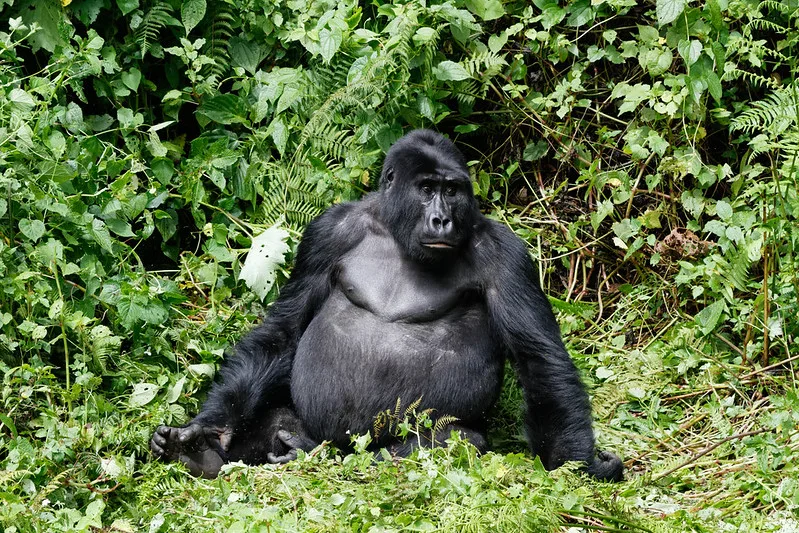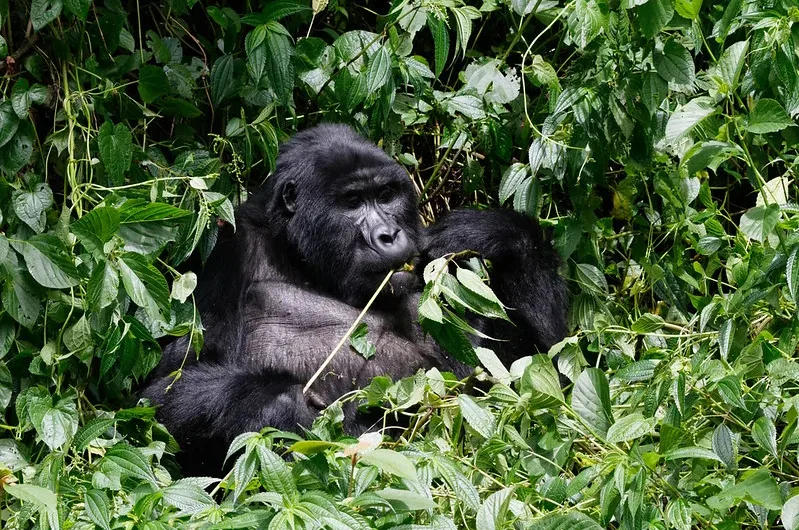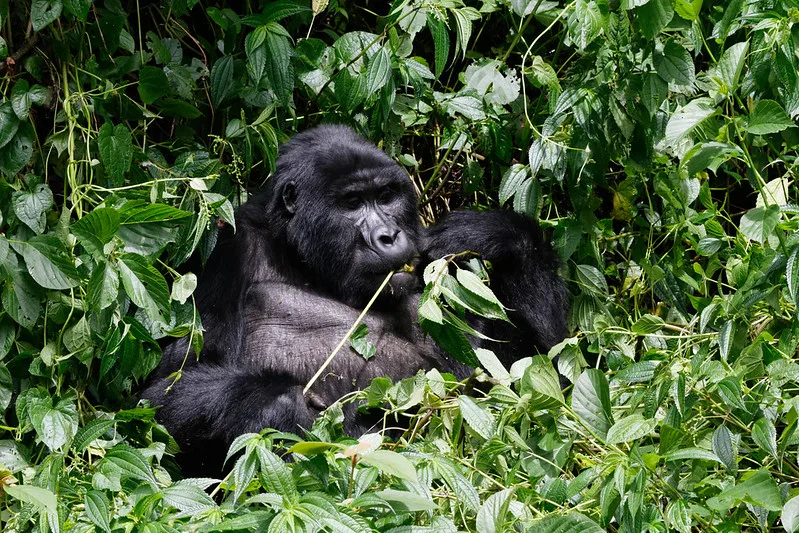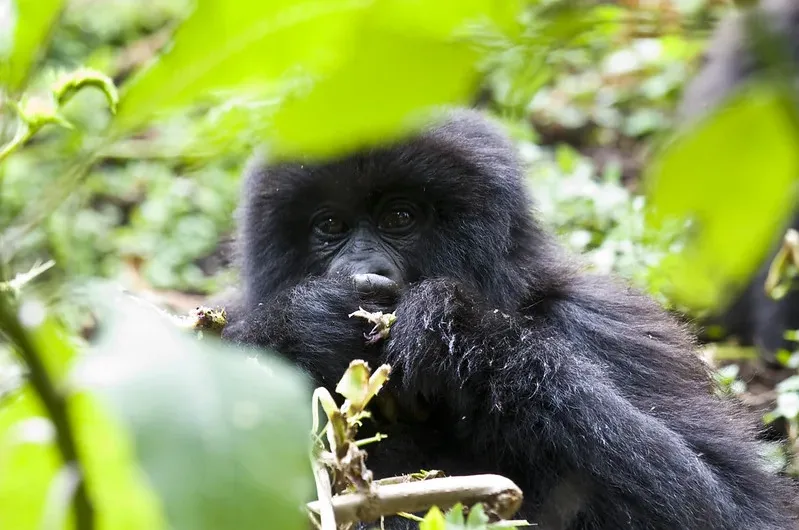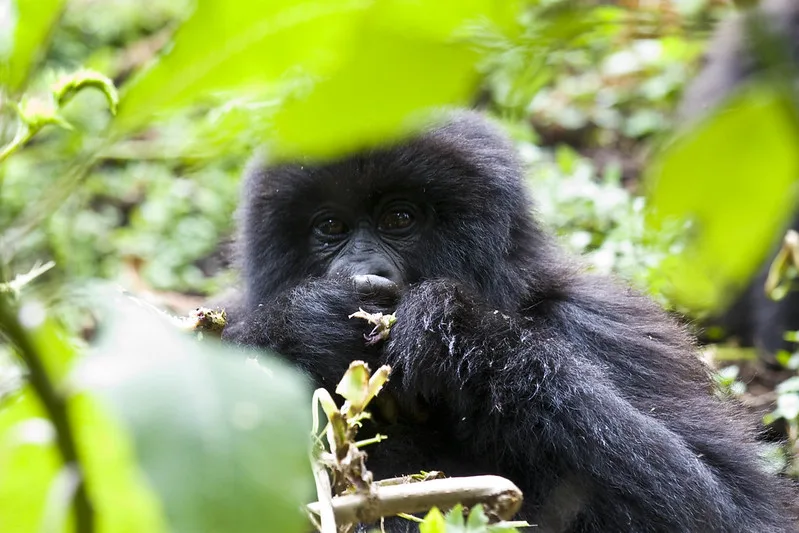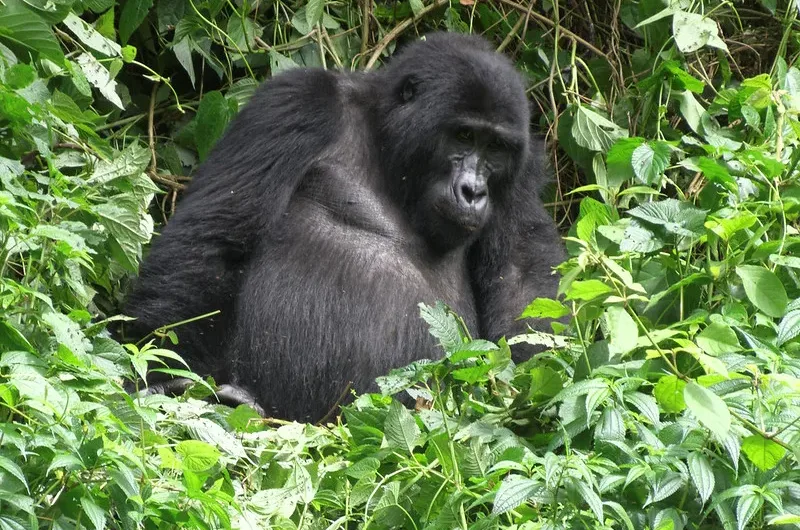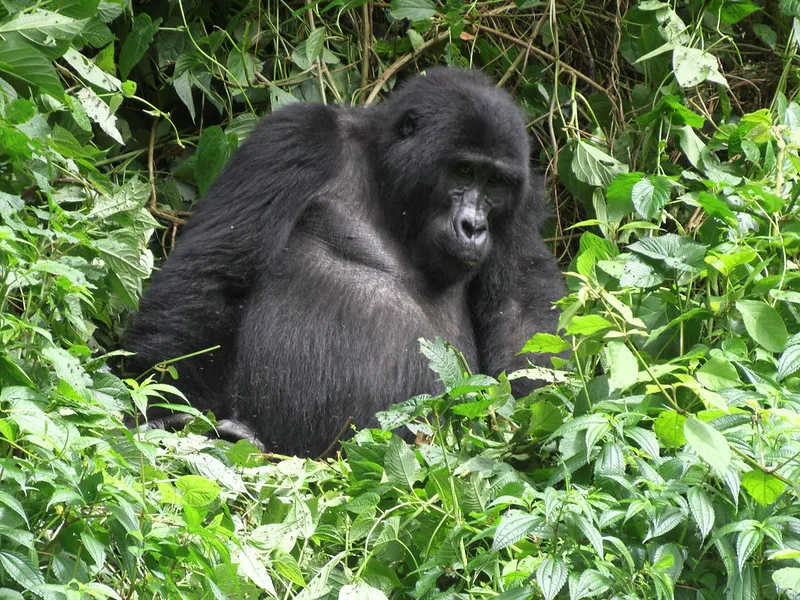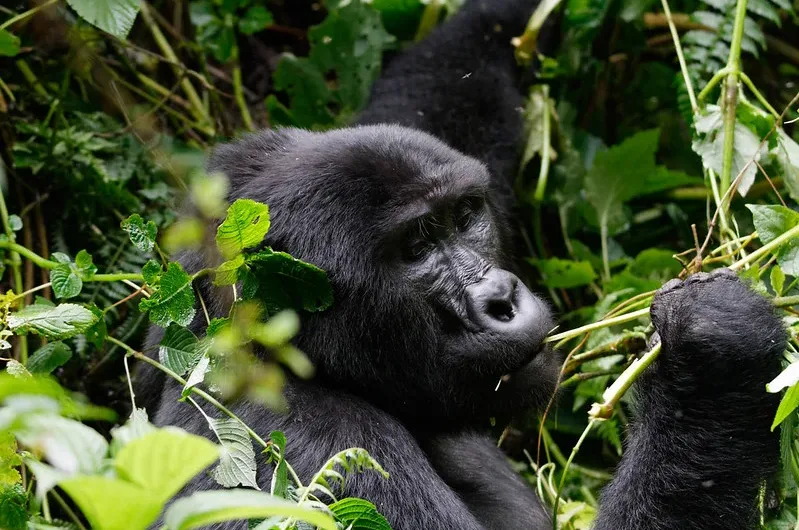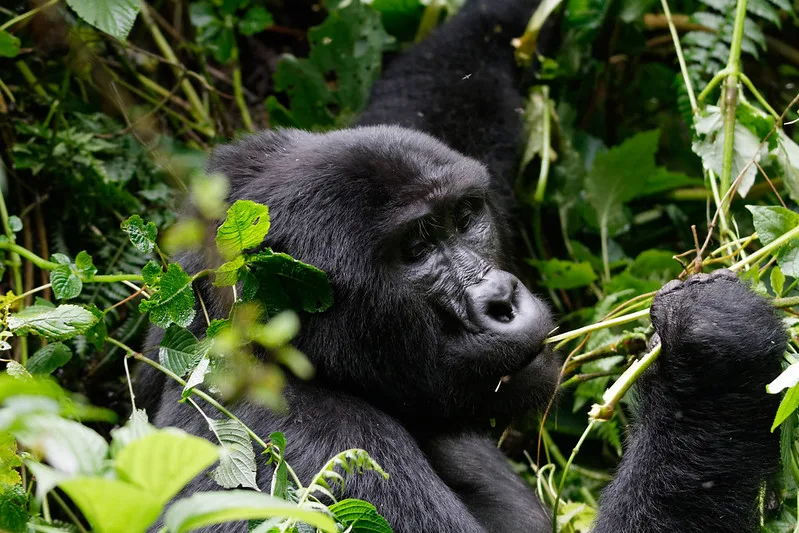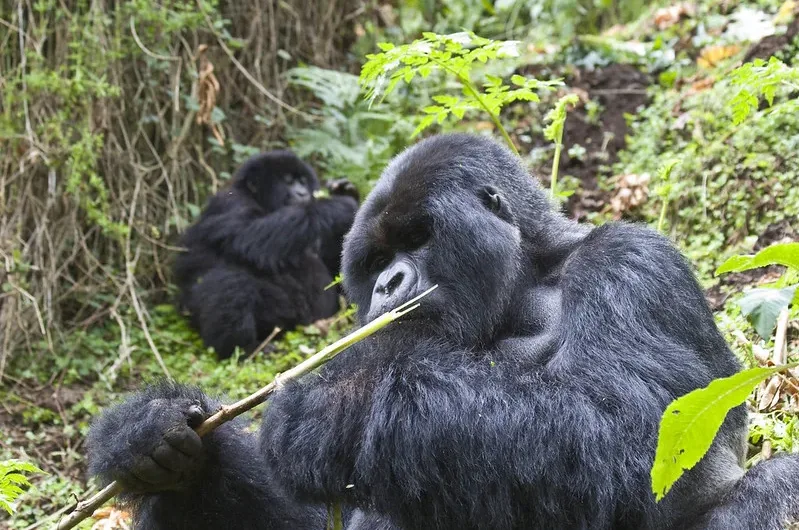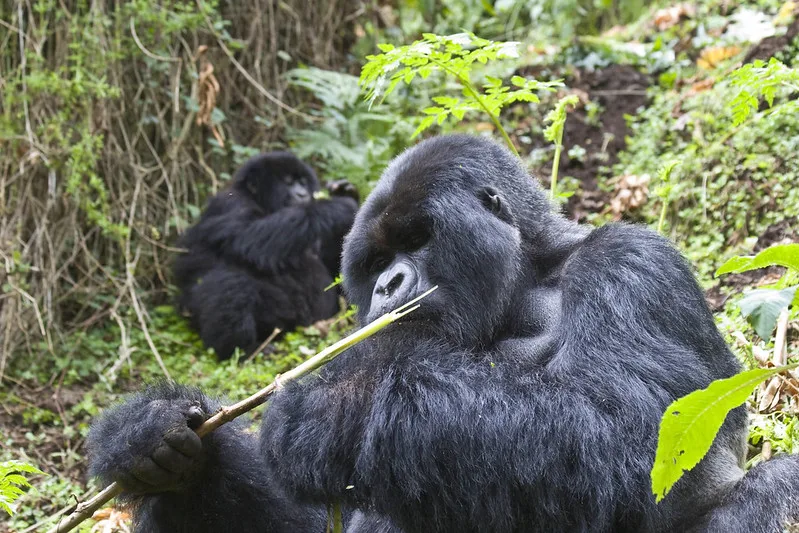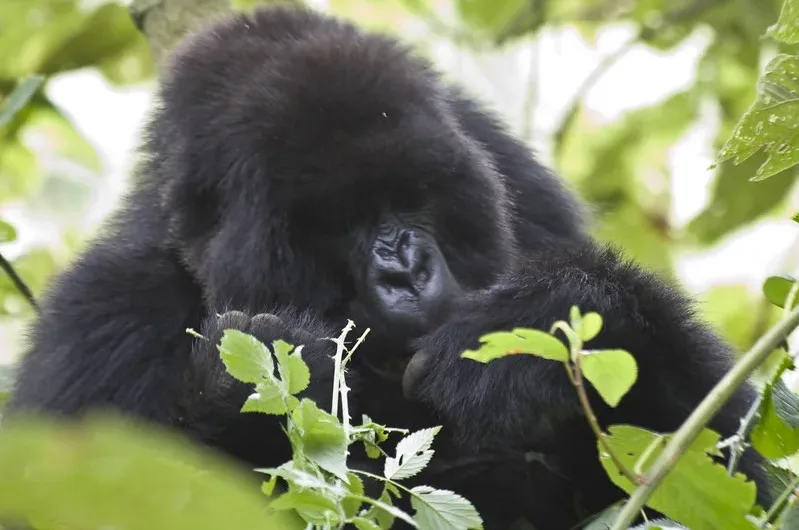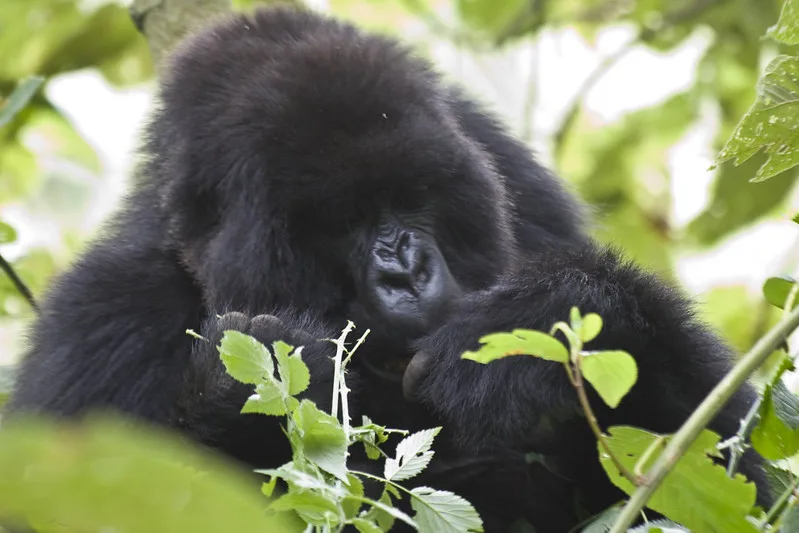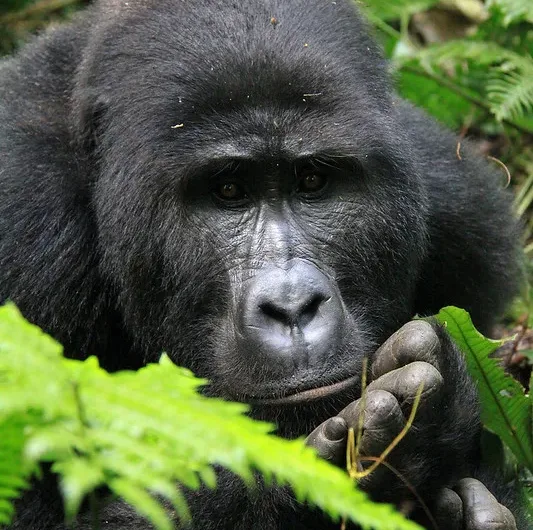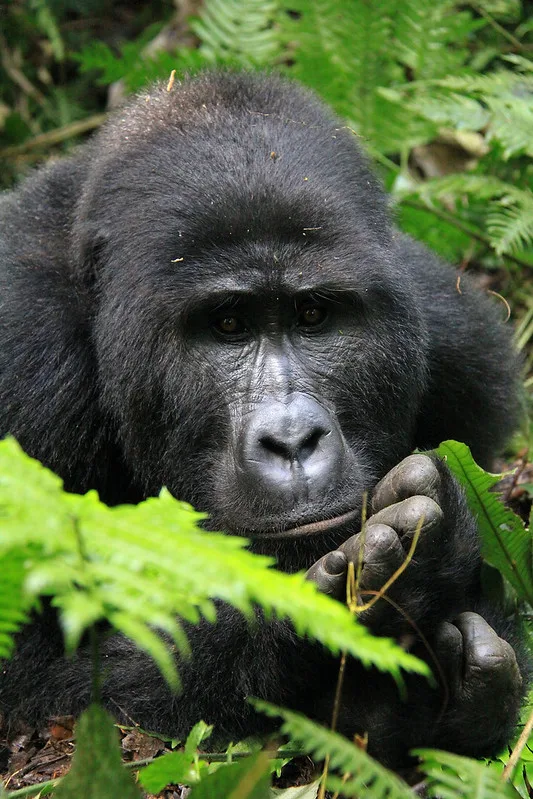New year gorilla and chimpanzee habituation experience in Bwindi and Kibale NPS
You can spend an additional four hours on safari with a maximum of four people if you choose to begin the new year with a gorilla and chimpanzee habituation adventure.
A unique safari for the New Year is to experience the habituation of gorillas and chimpanzees in Bwindi Impenetrable National Park and Kibale National Park. A year’s worth of effect can be created by rejuvenating your mind with a trip to some of the closest human relatives in the wild.
Enjoy the refreshing forest-regulated breeze while trekking chimpanzees in Kibale National Park and gorillas in Bwindi Impenetrable National Park during the early months of the year. Other primates, such as vervet monkeys and black and white colobus, can be found in these tropical jungles.
For any trip, a gorilla and chimpanzee permit would be ideal, and it must be scheduled to prevent last-minute panic when attempting to obtain these permits. Gorilla and chimpanzee permits for Uganda are highly sought after and quickly sold out over the holiday season. Chimpanzee licenses are limited to four per troop, while gorilla permits are limited to four per gorilla family each day.
What is the experience of gorilla habituation like?
In the trip known as “gorilla habituation,” you will follow a family of semi-habituated gorillas into the bush for four hours with a team of researchers and habituators. The gorilla habituation experience is only available to those who are at least 15 years old.
Gorilla habituation takes place in the southern region of Bwindi Impenetrable National Park in Uganda, and two families have been reserved thus far for this experience.
What is the habituation experience of chimpanzees?
The Chimpanzee Habituation Experience is an activity in which you accompany semi-habituated chimpanzees in the wild with a group of researchers and trackers to acclimate them to human presence without changing their character. Four hours are needed for chimpanzees to become accustomed to being around their closest human counterparts.
When Is It Best To Reserve Habituation Permits For Chimpanzees And Gorillas In Kibale National Park And Bwindi Impenetrable National Park?
Chimpanzee trekking permits should be booked at least three months in advance, whereas gorilla habituation permits should be booked at least six months to a year before the date. There are few lodging alternatives available, and permits for the holiday season, which includes New Year’s, are sold out in advance.
You must make reservations in advance for other safari amenities like lodging and transportation to gorilla and chimpanzee locations because this is a popular time of year for tourists visiting Uganda.
You can save last-minute stress by reserving chimpanzee habituation experience permits for Kibale National Park at least three months before the trekking date.
How Can I Reserve Habituation Permits for Gorillas and Chimpanzees in Kibale National Park and Bwindi Impenetrable National Park?
Choose the day you want to spend time with chimpanzees or gorillas in Uganda. Keep in mind that chimpanzee or gorilla habituation is a one-day process. Our Primate Safari Packages might serve as a model for you.
Our safari adviser looks up availability from the Uganda Wildlife Authority permit list when you contact us. One of the authorized tour operators with access to this list is katland Safaris. We are therefore no longer concerned about the inconvenience of phoning the Uganda Wildlife Authority to inquire about availability. We are no longer able to make our clients wait more than twenty-four hours to confirm availability, as we once did.
It is our recommendation that clients buy the gorilla or chimpanzee permits as soon as they become available. On a first-come, first-served basis, they quickly sell out.
Provide information such as nationality, date of birth, passport expiration date, and full names as listed on the passport. Your gorilla or chimpanzee habituation card, which you show on safari day, is updated with these facts to verify ownership and for record-keeping purposes.
How Much Do Chimpanzee and Gorilla Permits Cost in Uganda?
In Bwindi Impenetrable National Park, a gorilla habituation permit presently costs $1500 per person per trek for foreign nonresidents, $1000 per person for foreign residents, and 750000shs for East African residents.
Kibale National Park charges $300 per person each trek for chimpanzee habituation permits.
What is covered by the cost of the Bwindi and Kibale National Park Gorilla and Chimpanzee Habituation Permit Card?
Researchers, ranger guides, security during gorilla and chimpanzee habituation, local community support, four hours with either mountain gorillas or chimpanzees, conservation assistance for gorillas or chimpanzees, a certificate of completion of the trek, and park entrance fees are all included in the cost of the gorilla permit card.
What Does the Price of a Habituation Permit for Chimpanzees or Gorillas Include?
The following are excluded from gorilla or chimpanzee habituation permits: porter charge, so you can hire a porter to help you push and lift your habituation gear when you’re tired. No gratuity, transportation to the destinations, lodging, etc. are further exclusions from gorilla and habituation licenses.
To make your African safari trip wonderful and unforgettable, we at katland Safaris put together your gorilla and chimpanzee habituation amenities. Our safari packages are divided into three categories: luxury, mid-range, and budget. A gorilla and chimpanzee habituation safari has inclusions and exclusions for each.
Can I buy the Habituation Permit for Chimpanzees or Gorillas in installments?
You can buy your gorilla or chimpanzee permit in installments as long as you are inside the allotted time, but paying in full is the best option.
Installment payments of 30% and 70% are accepted by the Uganda Wildlife Authority for gorilla and chimpanzee permits, respectively. Those that buy their chimpanzee or gorilla licenses prior to ninety days of the habituation date are covered by this. You have to replenish before the 90-day mark, which is either chimpanzee or gorilla habituation adventure day.
Penalties are imposed for noncompliance.
Can my permit for a gorilla or chimpanzee habitat experience be rescheduled?
You can reschedule your permits as follows if you find that you are unable to attend the gorilla and chimpanzee habituation experience but still wish to do so in the future:
Method for Habituation Experience with Chimpanzees or Gorillas Rescheduled
Send a letter to the Uganda Wildlife Authority asking for a new date for your chimpanzee or gorilla habituation licenses. Those having installment-purchased gorilla and chimpanzee permits must top them up first.
If you have supporting documentation, please provide it along with your justification for wanting to change your habituation dates.
Once authorized, the dates of your gorilla or chimpanzee habituation experience are rescheduled to fit your new schedule, albeit this depends on availability at the time.
What is the duration of the chimpanzee and gorilla habitat in Kibale National Park and Bwindi Impenetrable National Park?
It is difficult to forecast how long gorilla or chimpanzee habituation will take because it depends on several factors:
The mountain gorilla or chimpanzee’s food is close by; the closer the feeding place is to the habituation experience’s beginning point, the faster you can find them and the earlier you can return.
When there is a battle between mountain gorilla families or inside the gorilla family due to habit, the losers may hide. You might spend a lot of time in the wild if you are assigned to the gorilla family.
The mountain gorillas typically spend the day on the slopes, which you must trek to, during the intense wet season. However, due to heavy rain and decomposing debris, the trails are slick and wet.
You might spend a lot of time in the forest if you are assigned to a sluggish group for gorilla or chimpanzee habituation because the rangers will follow the slowest group’s pace. By doing this, the likelihood of forgetting somebody in the wilderness is reduced.
Is it safe to experience gorilla or chimpanzee habitat in Bwindi or Kibale Forest?
Yes, even though you are following a troop of semi-habituated primates, it is safe to undergo gorilla or chimpanzee habituation. Under habituation, either chimpanzees or gorillas still exhibit wild behaviors like hiding and hooting at guests and other people.
By that time, the trackers and researchers are able to respond appropriately to the current behavior, so neither the chimpanzees nor the mountain gorillas are a threat. To avoid an intolerable situation, heed the researchers’ and ranger guide’s instructions if they exhibit strange behavior.
Prior to engaging in a gorilla or chimpanzee habituation event, heed the instructions given at the briefing.
Rangers from the Uganda Wildlife Authority work with other Ugandan security authorities to coordinate security issues in Kibale National Park and Bwindi Forest. When needed, they are there to maintain law and order in these locations.
Additionally, you should be mindful of your personal safety by only going into Kibale National Park or Bwindi Impenetrable National Park with a ranger guide accompanying you. They might be semi-habituated primates. Other woodland inhabitants, however, are not. Without the assistance of a qualified ranger, they might assault you.
When on a gorilla or chimpanzee habituation adventure, be mindful of the safety of your items in your room by preventing trespassers who could endanger your safety.
Safety gorilla and chimpanzee habituation equipment, such as long-sleeved shirts and pants, safari boots, insect repellent, and much more, can endure the circumstances in the bush.
How challenging is it to experience the habitat of gorillas and chimpanzees in Bwindi and Kibale National Park?
Chimpanzee and gorilla habituation are both conducted in the hard environment of the bush. Put on the chimpanzee or gorilla habituation gear.
You can avoid muscle strains while trekking to locate chimpanzees or mountain gorillas if you are somewhat athletic.
Gorilla habituation takes place in a rough terrain with mountains that you might have to travel across if the gorillas are spending the day there. The chimpanzee habituation experience in Kibale National Park, on the other hand, takes place in a comparatively level terrain, but it could take some time to locate them.
What Rules Apply to the Habituation Experience of Gorillas and Chimpanzees?
It is essential to wear a mask and clean your shoes before seeing chimpanzees and mountain gorillas.
Chimpanzees and mountain gorillas are not fed during habituation. Since they are untamed creatures, they have to look for nourishment. Stay at least 300 meters away from them if you want to dine or smoke.
Given that these primates are highly susceptible to contracting infectious diseases like the flu or COVID-19, offer to stay behind if you become infected.
Avoid encircling the gorillas and chimpanzees since your presence could make them feel ambushed.
Because gorillas and chimpanzees are afraid of new things in their environment, flash photography is not permitted during their habituation.
Spitting on plants or the ground is prohibited because it could contaminate the critically endangered primates with germs and cause a contagious disease.
Ask the ranger guide to dig a hole that is about 30 cm deep and cover it completely if you want to urinate.
It is prohibited to throw trash, especially non-biodegradable rubbish, into the forest. You change the environment in which mountain gorillas and chimpanzees live. Both primates eat leaves, stems, fruits, tubers, and other plants because they are inherently vegetarians.
To reduce the likelihood of encountering the mountain gorillas or chimpanzees, maintain an 8-meter distance from them when you find them. If they come near you, back off gradually so as not to raise suspicions.
It’s forbidden to provoke or imitate chimpanzees or mountain gorillas since you don’t know what you’re saying.
Only four hours are permitted before gorillas or chimpanzees during the habituation period.
What Should I Bring for the Habituation Experience with Gorillas and Chimpanzees?
To shield your feet from the hard conditions of the bush, wear safari boots.
Wearing rain gear in the wilderness will keep you dry.
To protect yourself from stinging nettle and other extreme situations, wear long-sleeved clothing.
Your skin feels comfortable using toiletries.
A large-brimmed hat or safari cap
Repellant for insects
In the event that you need to maintain a firm grasp, garden gloves
A camera
A pair of eyeglasses
An additional pair of stockings to attach to your pants
Rainproof equipment to use in unexpected downpours.
A flashlight
Flip-flops
A water-resistant backpack that you can provide to a porter if necessary
Some actual money.

